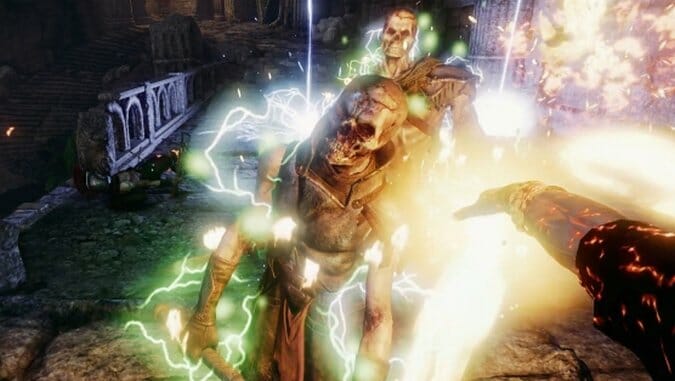
Artists often talk about breaking convention. Sometimes those conventions may be buried under so many traditions that it’s hard to deconstruct the clichés and get to the core on which the convention was built.
Deconstructing is what Lichdom: Battlemage does best. It paves a path that breaks a rigid convention that the role-playing genre has stuck to for far too long.
From the very outset, Lichdom has one primary objective—to focus exclusively on the mage character and revitalize the power of wielding magic, while shunning traditions that have become a staple in the role-playing genre.
That means the concepts of mana bars and cooldowns get chucked out of the window. The revamped system that Lichdom puts in its place as a substitute ensures you will have one of the more satisfying combat experiences in a RPG in recent memory.
Xaviant Studios have created a classic case of constructive deconstructionism. The game first strips down the magic system down to its very fundamentals, then analyses what works and then builds on its core strength—which is allowing the player to freely mix and match their strategy according to their spells with no artificial cooldown timer serving as the barrier for keeping the system “fair”. Lichdom instead relies on the basic elements of action involving a mix of reaction and strategizing and leaves it up to the player to utilize their unbarred magical power within that system. In doing so, Lichdom provides more than simply a satisfying experience of playing as a mage. It allows skill to take precedence over mere numbers, a complaint that can be directed at many role-playing games, particularly the Elder Scrolls series. In Lichdom you largely rely on your own reflexes and quick thinking to win most of the challenging battles and boss fights and relatively less on the numbers behind the damage you can do. As a direct comparison, it overshadows the magic systems of many RPGs and might even make it harder for you to enjoy its contemporaries in the genre which still holds you to such time-based constraints.
Barring few spikes in difficulty, at no point does the game feel particularly unbalanced due to the removal of two key constraints which have become the go-to staples for role-playing genre for almost two decades.
Lichdom runs on CryEngine 3. Its lofty requirements can be taxing on some of the lower end systems. Even if you meet the minimum requirements you might experience considerable lag and audio looping. But if you can get it to run properly, it is beautiful to look at, with impressive technical gloss and effects. Seeing the impact of your fire spells, with the embers flying in all directions, makes it incredibly satisfying to both watch and engage in the combat.
Sadly, Lichdom needs to provide an excuse for the players to wreak havoc with magic and to string its battles together and the story which does that barely serves the purpose. The basic premise is as clichéd as we can get—after your town is torn to shreds by a group of evil cultists, you are saved from the verge of death by a powerful mage who gives you some of his powers in order to take revenge while serving his own mysterious goals. It’s not offensively awful but it’s not anything special either and some of the early sections of the game featuring exposition via holograms can test your patience. The story doesn’t pass muster on its own terms or as a means to motivate you through your battles.
The evolution of the player and the combat system is another key area which Lichdom looks at from a slightly different perspective. Instead of just using levels to make the player more powerful, the game encourages you to craft your own combination of spells with the Sigils you’ve obtained. The only drawback to this is that all the Sigils are obtained at pre-determined points in the game. It’s a system that is free from the number-crunching RPGs are traditionally famous for while still having a surprising amount of depth and room for player experimentation.
For all the “freedoms” role-playing games provide players with, and the myriad ways in which they engage them, incorporating their skill in the combat system is a critical element many RPGs ignore. Lichdom: Battlemage succeeds in going against the grain in more than a few ways. While the experience is marred by a subpar story and a few strange design choices, the combat in Lichdom sets a new gold standard by which magic combat systems in RPGs will be held to.
Lichdom: Battlemage was developed by Xaviant. It is available for PC.
Ansh Patel is a game developer and an occasional pop culture critic who tweets philosophical ruminations and angry political rants @lightnarcissus. His words and games can be found at lightnarcissus.com.
